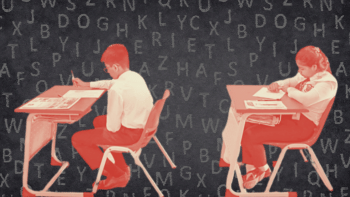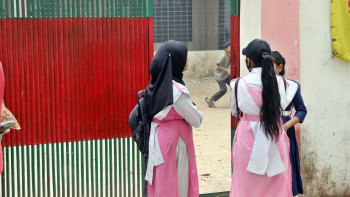Is education only about earning money?

"Lekhapora kore je, gari ghora chore shey" is a phrase with a history. It's a phrase that in one line depicts what it is that we expect from education. Although its origins are unclear, it makes sense that it would be the main mantra in times when there was widespread poverty. Indeed, education was, and remains, a tunnel to livelihoods. Is it time, in this age of high-rise buildings and mega development, to be mindful of such a phrase still running the show?
Today, the main focus of our education system—to most of us, that is—is for students to be equipped with employable skills so that they can get "good" jobs, earn a living and, ideally, contribute to the country's economic growth. The day has, however, come when we ask ourselves: is education only about earning money? Is that why we read literature and learn about history as well as maths and science? My deepest fear is that our dominant focus on the economic outcomes of education will lead to the elimination of the part of education that feeds our souls and not just our skills. I once went to a seminar where a private university faculty suggested that our universities should stop teaching "arts and humanities" subjects—the arts don't bring in the money, BBAs do, more so than even doctors these days. I was scared, and you should be too.
If you think about it, what purpose we let drive our narrative for education holds a powerful spell over us and shapes how we structure our curriculum, and our education system. What is our future if we have many well-earning, high-status, job-attained "gari chora" individuals who don't think twice before littering the streets, before taking a bribe in exchange for a favour, before harming others for their own profits? Profits have no ends, especially when we humans lose sight of humanity, and although education cannot make a difference alone, it remains one of the most effective weapons at our disposal in this fight for a much-needed change in our mindsets and narratives.
The key lies in changing what we expect from an education. Realising this, there is a large and growing literature now on the non-economic outcomes of education from around the world. To put it simply, there are economic and non-economic benefits of education, where economic outcomes are mostly to do with employment and GDP, and non-economic outcomes are to do with outcomes beyond the economic matters—better environments, lesser crime, more democracy, safety on our streets, among others. Part of my PhD work focuses on delving beyond economic outcomes of education, and I argue for the inclusion of non-economic outcomes in our approach to education. This means, above everything, that I want education to mean more than just earnings. I want it to equate to enlightenment—or at least that we aim for such.
No, we cannot do without earnings in this age of capitalism and money-oriented living, but nobody can deny that a world with just economic development and no societal moral integrity is not much of a world worth living in. While we see education as a means to eradicate physical poverty, we must remember that it has the potential to rid us of emotional and moral poverty too, and sadly, we may very well be in a crisis and shortage of morality already.
We need to design our education to be more holistic—to include ways that help students become more civically engaged, responsible and kinder human beings. On the one hand, we need to figure out what works: how do we redesign our education to make sure that what we aim for translates into real change? How do we ascertain that making kindness a larger focus of our education actually makes individuals become kinder towards others?
These are questions I think about in my PhD, but constantly come to the realisation that education alone cannot do wonders. If we do not comprehensively, as a society, change what we value, any change that we make in our education system will not be able to magically make a difference. Consider, for example, how each of our textbooks in the general stream, from Class 1 to Class 10, has a quote on the back—sometimes about honesty, sometimes about patriotism. If our children see dishonesty everywhere around them, if they see dishonesty being rewarded, if they learn from real life that profit at the cost of honesty is the "smart" choice, how can we ever expect a mere quote on the back of their textbook to make a mark on their minds? We cannot.
We need to rethink our entire education system, from its purpose to what we include in our textbooks. We need social work activities to be a part of our curriculum where students get to engage with homeless children, where they get to visit slums and rural villages. We need school programmes that teach students about trees, plants and our soil. We need anti-littering initiatives and cleaning campaigns. We need our parents, teachers and all stakeholders to get on board with redefining the purposes that education is meant to serve.
We wouldn't be the first nation to implement such ideas. Seeing Japanese people picking up trash, not only after themselves but also after others, when they finish watching a world cup match in the stadium—education has a role to play in the development of this attitude. In Africa, the "Ubuntu" worldview influences individuals to adopt a collective and community-based orientation in their communities, and so they value, as priceless qualities, helping each other and progressing together in unity.
We need to find our own Ubuntu. We need a peak in social consciousness, and not just in our GDP: a widespread social consciousness where individuals are sensitive to ethical, moral and humanitarian issues, where they recognise the impact of their actions on others and on the broader community, where they behave with empathy and compassion and advocate for fairness, equality, and justice. A social consciousness that, ultimately, fosters a collective effort to create a more just and compassionate world for all. We need to reshape our education system so that it delivers not just skilled human capital, but skilled human beings with social consciousness. Undeniably, education is the way that a society articulates its values—the way that it transmits its values. So, what do we value?
Rubaiya Murshed is a PhD researcher at the Faculty of Education, University of Cambridge. She is also a lecturer (on study leave) at the Department of Economics, University of Dhaka.
Views expressed in this article are the author's own.
Follow The Daily Star Opinion on Facebook for the latest opinions, commentaries and analyses by experts and professionals. To contribute your article or letter to The Daily Star Opinion, see our guidelines for submission.

 For all latest news, follow The Daily Star's Google News channel.
For all latest news, follow The Daily Star's Google News channel. 









Comments